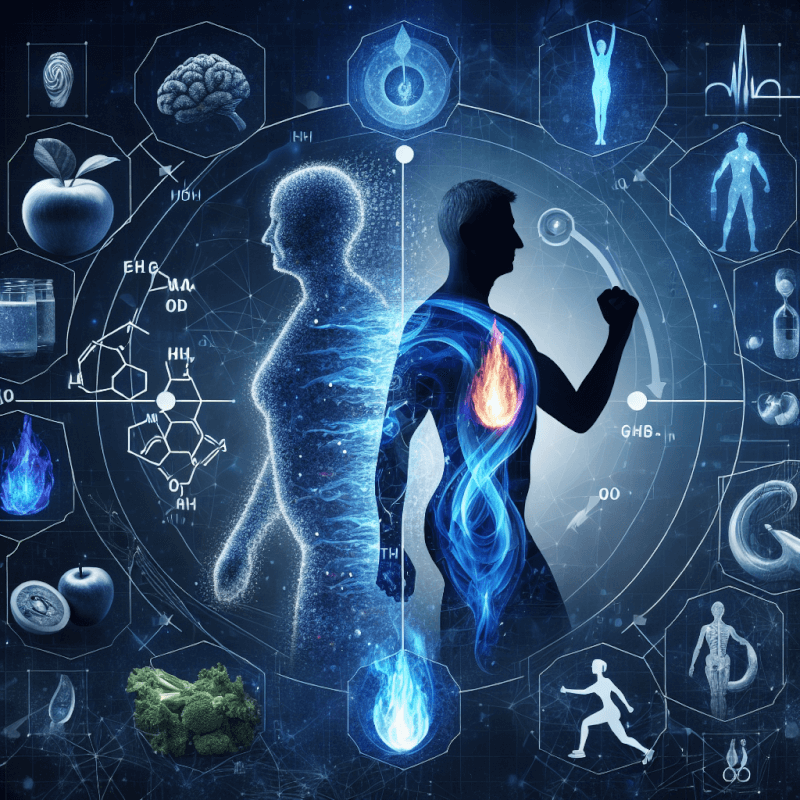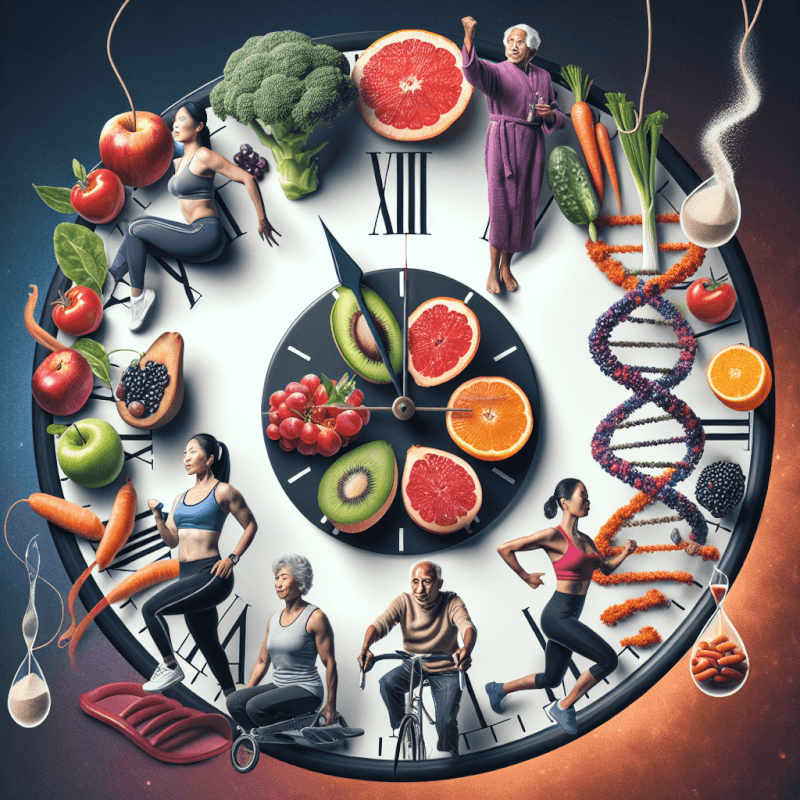As we get older, our bodies undergo various changes, including how our metabolism functions. Aging can cause a decrease in metabolism, making it more difficult to maintain a healthy weight and energy levels. However, there are ways to adapt and support your metabolism as you age. In this article, we will explore the impact of aging on metabolism and provide practical tips on how you can adapt your lifestyle to keep your metabolism running smoothly. So, let’s delve into the fascinating world of metabolism and discover how you can make positive adjustments to support your overall well-being.
Factors that Influence Metabolism
Basal Metabolic Rate (BMR)
Your basal metabolic rate (BMR) refers to the number of calories your body requires to perform basic functions while at rest. Factors such as age, gender, and body composition influence your BMR. As you age, your BMR typically decreases due to a decrease in muscle mass and hormonal changes. However, there are ways to maintain a healthy metabolism as you age.
Physical Activity Levels
Engaging in regular physical activity plays a crucial role in boosting your metabolism. Including activities such as brisk walking, jogging, or cycling in your routine can help increase your energy expenditure. Regular exercise also helps maintain muscle mass, which aids in sustaining a healthy metabolism.
Muscle Mass
Muscle mass is one of the primary factors influencing your metabolism. As you age, there is a natural decline in muscle mass, which lowers your metabolic rate. To counteract this, incorporating strength training exercises and resistance training into your fitness regimen can help preserve muscle mass and support a healthy metabolism.
Hormonal Changes
Hormonal changes are inevitable as you age and can profoundly impact your metabolism. In women, the decline in estrogen levels during menopause can lead to weight gain and a decrease in metabolic rate. Similarly, men experience a decline in testosterone levels, which can also affect metabolism. Understanding these hormonal changes can help you adapt your lifestyle choices accordingly.
Genetics
Your genetic makeup also plays a significant role in determining your metabolic rate. Some individuals may be genetically predisposed to have a faster or slower metabolism. While you cannot change your genetics, being aware of this factor can help you make informed choices about your diet and exercise routine.
Dietary Intake
The food you eat has a direct impact on your metabolism. Consuming a well-balanced diet that includes lean proteins, whole grains, fruits, and vegetables is crucial for maintaining a healthy metabolism. Additionally, staying hydrated and avoiding excessive alcohol consumption can positively influence your metabolic rate.
Metabolism and Aging
Theories of Aging
There are several theories that attempt to explain the aging process, including the free radical theory and the mitochondrial theory. The free radical theory suggests that accumulated damage from free radicals, which are unstable molecules, contributes to aging. The mitochondrial theory proposes that the decline in mitochondrial function leads to a decrease in energy production and contributes to aging.
Decline in Basal Metabolic Rate
One of the most significant changes in metabolism with aging is a decline in basal metabolic rate (BMR). BMR determines the number of calories your body needs at rest. As you age, your body composition changes, typically resulting in a decrease in muscle mass and an increase in fat mass. This shift leads to a decrease in BMR and, consequently, a slower metabolism.
Impacted Hormonal Levels
Hormonal levels also change with age and can affect metabolism. For women, the decline in estrogen during menopause can lead to weight gain and a decrease in metabolic rate. In men, there is a gradual decline in testosterone levels, which can impact muscle mass and metabolism. These hormonal changes contribute to the overall decline in metabolic rate as you age.
Changes in Body Composition
Aging is associated with changes in body composition, primarily due to a decrease in muscle mass and an increase in fat mass. The decline in muscle mass results in a slower metabolism, as muscle burns more calories at rest compared to fat. This change in body composition can have significant implications for weight management and overall metabolic health.

Effects of Aging on Metabolism
Slower Metabolic Rate
As you age, your metabolic rate naturally slows down. This slowdown is primarily attributed to a decrease in muscle mass and a decline in physical activity levels. With a slower metabolic rate, your body burns fewer calories, which can lead to weight gain if your dietary intake remains unchanged.
Reduced Energy Expenditure
With a slower metabolic rate, your overall energy expenditure decreases. This means that you burn fewer calories throughout the day, even when engaged in physical activity. It is essential to be mindful of this change and make adjustments to your lifestyle to avoid weight gain.
Loss of Muscle Mass
One of the significant impacts of aging on metabolism is the loss of muscle mass. Starting around the age of 30, individuals begin to experience a gradual decline in muscle mass known as sarcopenia. This loss of muscle mass leads to a decrease in metabolic rate, making it more challenging to maintain a healthy weight as you age.
Increased Fat Storage
With age, there is a natural tendency for the body to store more fat, particularly around the midsection. This increase in fat storage is partly due to hormonal changes and partly due to the decline in metabolic rate. Increased fat storage can lead to weight gain and an increased risk of chronic diseases such as diabetes and cardiovascular disease.
Altered Nutrient Absorption
As you age, your ability to absorb certain nutrients may be compromised. Nutrients such as vitamin B12, vitamin D, and calcium may require increased consumption or supplementation to ensure optimal absorption. Monitoring nutrient intake becomes vital to address potential deficiencies and support overall metabolic health.
Tips for Adapting to Changing Metabolism
Maintain a Balanced Diet
Adopting a well-balanced diet is crucial for supporting a healthy metabolism as you age. Include a variety of fruits, vegetables, lean proteins, whole grains, and healthy fats in your meals. Be mindful of portion sizes and make sure to consume adequate calories to meet your body’s needs.
Engage in Regular Physical Activity
Regular exercise is essential for maintaining a healthy metabolism. Aim for at least 150 minutes of moderate-intensity aerobic activity per week, such as brisk walking or cycling. Additionally, incorporate strength training exercises at least twice a week to preserve muscle mass and support metabolic health.
Resistance Training
Including resistance training exercises in your routine will help build and maintain muscle mass. This, in turn, helps increase your metabolic rate, allowing your body to burn more calories even at rest. Work with a fitness professional to develop a safe and effective resistance training program.
Cardiovascular Exercise
Cardiovascular exercise, such as jogging or swimming, helps increase your heart rate and calorie expenditure. Regular cardiovascular exercise can improve cardiovascular health, enhance endurance, and support weight management. Find activities you enjoy and make them a part of your weekly exercise routine.
Seek Professional Guidance
If you are uncertain about how to adapt to your changing metabolism, consider seeking guidance from healthcare professionals. Consult a registered dietitian who specializes in geriatric nutrition to develop a personalized meal plan. Additionally, work with a fitness expert who can design an exercise regimen tailored to your needs and abilities.
Stay Hydrated
Hydration is essential for overall health and metabolism. Adequate hydration helps maintain proper bodily functions, including digestion and nutrient absorption. Aim to drink at least eight glasses of water per day and increase your intake during periods of physical activity or hot weather.
Manage Stress Levels
Chronic stress can have a negative impact on metabolism. Find healthy ways to manage stress, such as practicing mindfulness techniques, engaging in hobbies, or seeking support from loved ones. Manage your time effectively, prioritize self-care, and make relaxation a part of your daily routine.
Get Sufficient Sleep
Adequate sleep is crucial for maintaining a healthy metabolism. Lack of sleep can disrupt hormonal balance, leading to changes in appetite regulation and increased cravings for sugary and high-fat foods. Aim for seven to nine hours of quality sleep each night to support your overall metabolic health.

Balanced Diet for Aging Metabolism
Eat Adequate Protein
Including adequate protein in your diet is essential for preserving muscle mass and supporting metabolic health. Good sources of protein include lean meats, poultry, fish, beans, lentils, tofu, and dairy products. Aim to distribute your protein intake evenly throughout the day to optimize muscle synthesis.
Include Fiber-rich Foods
Fiber-rich foods contribute to satiety and can help manage weight as you age. Include plenty of fruits, vegetables, whole grains, and legumes in your diet. These foods provide essential nutrients and support gut health, promoting overall metabolic well-being.
Choose Whole Grains
Opting for whole grains instead of refined grains is a healthier choice for your metabolism. Whole grains such as oats, brown rice, quinoa, and whole wheat contain more fiber and nutrients. They provide sustained energy, regulate blood sugar levels, and support digestive health.
Consume Healthy Fats
Include healthy fats such as avocados, nuts, seeds, and olive oil in your diet. These fats provide essential fatty acids and help regulate inflammation in the body. Be mindful of portion sizes, as fats are higher in calories compared to proteins and carbohydrates.
Stay Hydrated
Adequate hydration is essential for maintaining a healthy metabolism. Water helps regulate body temperature, aids digestion, and supports nutrient absorption. Make it a habit to drink water with meals and carry a reusable water bottle to ensure adequate hydration throughout the day.
Consider Micronutrient Needs
As you age, your nutritional needs may change. Pay attention to your intake of vitamins and minerals, particularly vitamin B12, vitamin D, calcium, and iron. If necessary, consult a registered dietitian to determine if supplementation is needed to meet your specific requirements.
Exercise Recommendations for Aging Metabolism
Balance of Resistance Training and Cardiovascular Exercise
To support a healthy metabolism, aim for a balance between resistance training and cardiovascular exercise. Incorporating both types of exercise into your routine will help maintain muscle mass, burn calories, and support cardiovascular health.
Strength Training for Muscle Preservation
Strength training exercises, such as lifting weights or using resistance bands, help preserve and build muscle mass. Engaging in regular strength training activities can increase your metabolic rate, allowing you to burn more calories even at rest.
Include High-Intensity Interval Training (HIIT)
High-intensity interval training (HIIT) involves alternating periods of intense exercise with short rest periods. HIIT workouts are effective at boosting metabolism, increasing calorie burn, and improving cardiovascular fitness. Incorporate HIIT sessions into your routine with exercises like sprints, burpees, or jumping jacks.
Low-impact Activities for Joint Health
As you age, it’s essential to choose exercises that are gentle on your joints. Low-impact activities such as swimming, cycling, or using an elliptical machine can provide cardiovascular benefits without putting excessive stress on your joints. These activities support metabolic health while minimizing the risk of injury.

Understanding Hormonal Changes
Menopause and Estrogen Levels
During menopause, a woman’s estrogen levels decline significantly, leading to various changes in the body. Estrogen plays a role in regulating metabolism, and its decline can contribute to weight gain or a slower metabolic rate. It is essential for women going through menopause to adapt their lifestyle choices accordingly to support metabolic health.
Testosterone Decline in Men
Similar to women, men also experience hormonal changes with age, including a decline in testosterone levels. Testosterone is vital for maintaining muscle mass and supporting metabolic function in men. The decline in testosterone can lead to a decrease in muscle mass and metabolic rate, making it crucial for men to focus on lifestyle strategies that support metabolic health.
Impact of Thyroid Hormones
The thyroid gland produces hormones that regulate metabolism. With age, there can be changes in thyroid function, leading to an underactive thyroid (hypothyroidism). Hypothyroidism can result in a slower metabolic rate, weight gain, and feelings of fatigue. If you suspect thyroid-related concerns, it is crucial to consult with a healthcare professional for appropriate diagnosis and management.
Role of Insulin and Blood Sugar Regulation
Insulin is a hormone that helps regulate blood sugar levels. With age, the body’s ability to utilize insulin may decrease, leading to insulin resistance or impaired glucose tolerance. These conditions can negatively impact metabolism and increase the risk of developing type 2 diabetes. Managing blood sugar levels through a balanced diet, regular exercise, and weight management is crucial for metabolic health as you age.
Maintaining Muscle Mass
Strength Training and Resistance Exercises
Engaging in strength training exercises is crucial for maintaining and building muscle mass. Incorporate exercises such as weightlifting, resistance band workouts, or bodyweight exercises into your routine. Aim for at least two days of resistance training per week to reap the benefits of preserving muscle mass and supporting a healthy metabolism.
Protein Intake and Muscle Synthesis
Protein is the building block of muscles. Consuming adequate protein is essential for preserving muscle mass and promoting muscle synthesis. Include protein-rich foods such as lean meats, poultry, fish, eggs, dairy products, and plant-based protein sources in your diet.
Adequate Caloric Intake
Maintaining an adequate caloric intake is crucial for supporting muscle mass. Consuming fewer calories than your body needs can lead to muscle loss. Calculate your daily calorie needs based on your age, gender, activity level, and consult with a registered dietitian to design an appropriate caloric intake plan.
Avoiding Sedentary Lifestyle
Leading a sedentary lifestyle can contribute to muscle loss and a decline in overall metabolic health. Incorporate regular physical activity into your daily routine to avoid a sedentary lifestyle. Engage in activities such as walking, gardening, or dancing to keep your muscles active and maintain a healthy metabolism.

Managing Weight and Body Composition
Focus on Nutrient-dense Foods
When managing your weight and body composition, focus on consuming nutrient-dense foods. These foods are rich in essential nutrients while being relatively low in calories. Include fruits, vegetables, whole grains, lean proteins, and healthy fats in your diet to ensure a balanced and nutritious intake.
Portion Control
Practicing portion control is crucial for weight management. Overeating can lead to weight gain, while consistently consuming fewer calories than your body needs can result in weight loss. Be mindful of portion sizes and use strategies such as eating from smaller plates and listening to your body’s hunger and fullness cues.
Monitor Caloric Intake
Monitoring your caloric intake is essential for managing weight and body composition. By tracking your calorie consumption, you can ensure that you are meeting your body’s needs without exceeding them. Utilize tools such as food tracking apps or consult with a registered dietitian to help you establish appropriate caloric goals.
Understand Metabolic Changes
As you age, it is crucial to understand the metabolic changes that occur and adapt your lifestyle choices accordingly. Educating yourself about factors such as declining muscle mass, hormonal changes, and slowed metabolic rate can help you make informed decisions about your diet, exercise, and overall well-being.
Stress Management
Chronic stress can contribute to weight gain and metabolic disturbances. Implement stress management techniques such as meditation, deep breathing exercises, or engaging in activities that bring you joy and relaxation. Managing stress effectively can positively impact your metabolism and overall health.
Importance of Professional Guidance
Consulting a Registered Dietitian
A registered dietitian can provide personalized guidance regarding your changing metabolic needs. They can assess your nutritional requirements, design a meal plan that supports healthy metabolism, and provide ongoing support and education. Consulting a registered dietitian can help you navigate dietary challenges and promote long-term metabolic health.
Seeking Guidance from Fitness Experts
Working with fitness professionals can help you design exercise programs that support a healthy metabolism. They can tailor workouts to your abilities, provide guidance on form and technique, and ensure your safety during physical activity. Seek the expertise of certified trainers or exercise physiologists to optimize your exercise routine.
Tailoring Strategies to Individual Needs
Every person’s metabolism and needs are unique. It is essential to tailor strategies to your individual circumstances. Working with healthcare professionals, registered dietitians, and fitness experts can help you develop personalized plans that consider your age, health status, goals, and preferences. This individualized approach optimizes your chances of success in adapting to changes in your metabolism.
In conclusion, aging can bring about changes in metabolism, including a decline in basal metabolic rate, decreased muscle mass, and altered hormonal levels. However, by understanding these factors and making lifestyle adjustments, it is possible to adapt to these changes and support a healthy metabolism as you age. Maintaining a balanced diet, engaging in regular physical activity, preserving muscle mass, managing weight, and seeking professional guidance are key strategies for adapting to changing metabolism and promoting overall well-being. Remember, it’s never too late to prioritize your metabolic health and embrace a healthy lifestyle.



